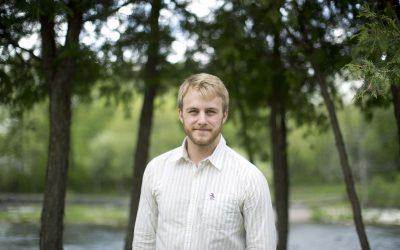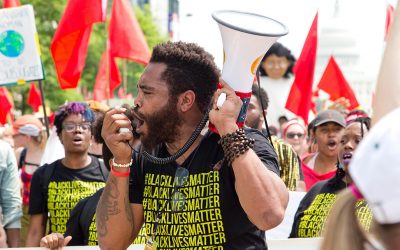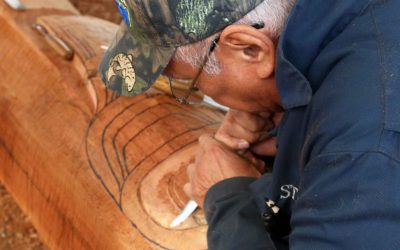The Wet’suwet’en and the Space Between (EXCLUSIVE)
Photo by Michael Toledano
By Culturally Modified Staff
This week, Wet’suwet’en Hereditary Chief Na’Moks, the highest ranking chief of the Tsayu clan, and Chief Knedebeas, the highest ranking chief of the Gilseyhu clan and House Chief of the Unist’ot’en, sat across from our Publisher, Rick Budhwa, in the Culturally Modified office.
About 130 kilometres from our Smithers office, is the Unist’ot’en camp, the site where Wet’suwe’ten people and supporters have gathered to prevent Coastal GasLink’s pipeline project from trespassing over Wet’suwe’ten traditional territory. The project was approved with the consultation of the majority of elected band councils, but they only have jurisdiction over reserves. The hereditary chiefs, on the other hand, have jurisdiction over the 22,000 square kilometres of Wet’suwet’en traditional territory, including the site of the pipeline project. At issue is Coastal GasLink’s and the B.C. provincial government’s consultation with band-elected government over something that isn’t in their jurisdiction. This is why there are land protectors on the project site, and why the RCMP have been removing the land protectors.
Last year with the conflict that was there, it was our matriarchs, our ladies, who went up there and said [to our people], ‘you guys have a big pot of soup, you make sure they eat too.
In this emotionally charged and highly sensitive situation, there is no shortage of information in the media, yet according to the Chiefs, not all of it is accurate. Chief Knedebeas says, “I do a lot of reading about all this that’s going on. There is a lot of bad information out there. This is too important, and people and the media need to take their time and get all of their facts straight.”
In an effort to provide clarification, Chief Na’Moks and Chief Knedebeas discuss the RCMP, industry, and government with us.
“Under the uniform of the RCMP are human beings”
It’s easy to cast everyone into stereotyped roles after seeing polarizing imagery in the media. According to Chief Na’Moks, remembering the humanity of each individual is important — even in the midst of conflict. “Under the uniform of the RCMP are human beings. Last year with the conflict that was there, it was our matriarchs, our ladies, who went up there and said [to our people], you guys have a big pot of soup, you make sure they eat too. They’re humans.’ Under that uniform, they are human. We can’t be mad at each other personally.”
He says, “I have a daughter that’s RCMP. Clan members that are RCMP. I have family members that serve in the military, whether it be army, air force, navy. That’s my family. My dad is a second world war veteran. Am I going to go and burn the Canadian flag? No. Am I going to respect the uniform? To a certain point. That’s still my father under there.”
"We just want to maintain what we have"
Throughout colonial history, disputes regarding Indigenous land have often been framed with language, as discussed in our article, Policing Indigenous Dissent: Trends Behind Wet’suwet’en Raid. For years following the Battle at Batoche in Saskatchewan in 1885, history books referred to the battle as a rebellion, and Indigenous peoples involved were called traitors. Language continues to shape the way we understand disagreements: it is often easier to resort to categories such as pro and anti, or labels such as extremist and militant. Where land disputes and resource extraction are concerned, it is common to paint Indigenous peoples as anti-business, or anti-progress.
We’re not stopping forward thinking — we just need them to catch up to us. We’re thousands of years ahead. Because you need to protect the land.
Chief Na’Moks responds, “the Wet’suwet’en have never ever wanted more than what we have. We just want to maintain what we have. And we are part of progress. You got to look at the largest sawmill on this entire planet, on Wet’suwet’en territory. And we know the taxes from that build schools, infrastructure, hospitals, airports. We never stopped that. That’s part of progress. I can go to the hospital, and I know tax money from there helps that. We’re not stopping forward thinking — we just need them to catch up to us. We’re thousands of years ahead. Because you need to protect the land.”
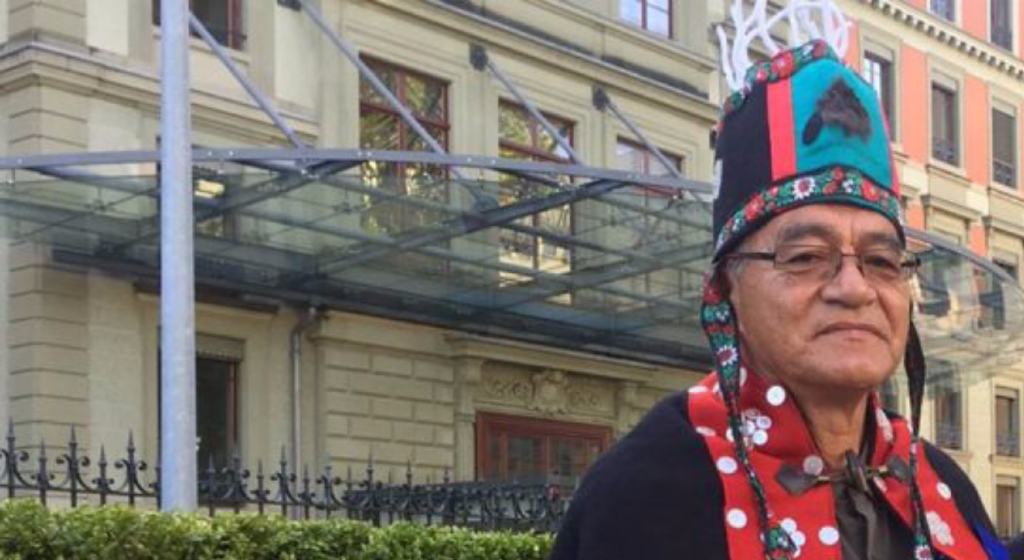
Chief Na’Moks. Photo courtesy of John Ridsdale.
“We can’t eat money, I don’t have a recipe for frying it or baking it. But we can eat our fish, our moose — our berries are out there, our medicines are out there, our clean water is out there. We have recipes for that. But we can’t eat money. Money can be spent. Once you’ve got it, it’s gone. Then you want more. We just want to keep what we have.”
"They paint us all with one brush"
Regarding the disagreement between Wet’suwet’en hereditary chiefs and band-elected council members, Na’Moks says it’s important that provincial and federal governments consult with the hereditary chiefs.
“They paint us all with one brush,” Chief Na’Moks says. “We are open, honest, honourable people. And yet they will go to a band-elect system that only has jurisdiction within the postage-sized stamp of the reserve itself and say that they have jurisdiction on the land. We’re hereditary, we’re traditional. We look after the 22,000 square kilometres.”
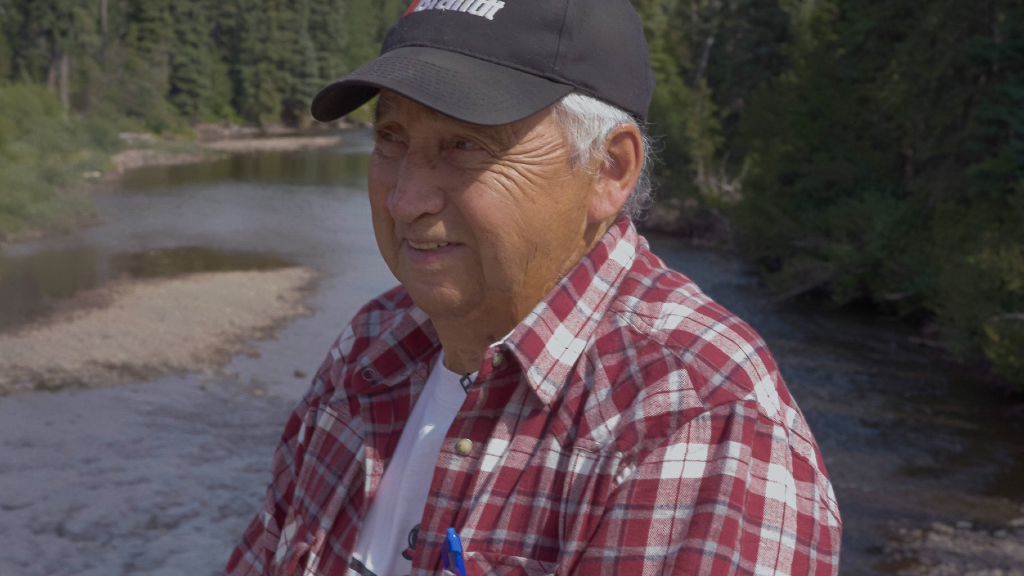
Chief Knedebeas
Chief Knedebeas, who spent his entire career working in the forestry industry, has seen how industry and government have changed over the past 7 decades. He says, “it does not feel that government negotiates with us in good faith. And it always follows their agenda. Until that changes, we are spinning our wheels.”
This isn’t just an Indigenous issue — I believe this is a human rights issue, because we must all live together.
Chief Na’Moks provides historical context. He says, “we were here far before anybody had contact with us. What we’re doing today is exactly what our ancestors did. Look after the land, the air, the water, the culture, and all people who reside on it. This isn’t just an Indigenous issue — I believe this is a human rights issue, because we must all live together.”
"You know how we cure it? We share a meal."
Chief Na’Moks points to Wet’suwet’en feast halls as spaces where people can come together to discuss. “We share a meal. We have teas. That’s to discuss things. The band-elects that have signed on, they’re still our relatives. When this is over, when [Coastal GasLink] is gone, which they will be, we still got to be in the feast hall together assisting each other. It can’t only be in a time of need and sorrow. But we must be together. We are a Nation. That’s what a Nation is. In our laws of the feast halls you leave everything outside and deal with the business honourably. That’s going to come back again.”
We share a meal. We have teas. That’s to discuss things. The band-elects that have signed on, they’re still our relatives. When this is over, when [Coastal GasLink] is gone, which they will be, we still got to be in the feast hall together assisting each other.
Chief Knedebeas expresses a longing for that ability to come together and have discussions. “Things never used to be like this. We used to be able to talk to each other more easily,” he says.
"Underneath it all, my family is married into all nations of the world."
For Chief Na’Moks, it’s the memory of his mother that grounds him. “Underneath it all, my family is married into all nations of the world,” he says. “My late mom called her grandchildren, her grandchildren. She didn’t say: ‘oh, you’re half Ukranian. You’re half English. You’re half Nisga’a. You’re half Tsimshian. And you’re half Haida. No, she says, ‘you’re my grandchildren.’ That’s what we should remember.”
